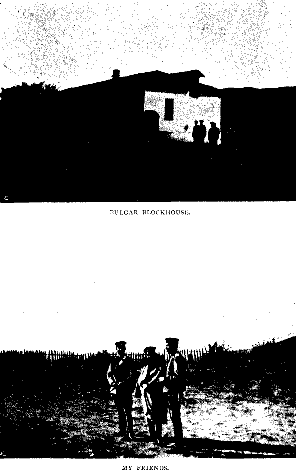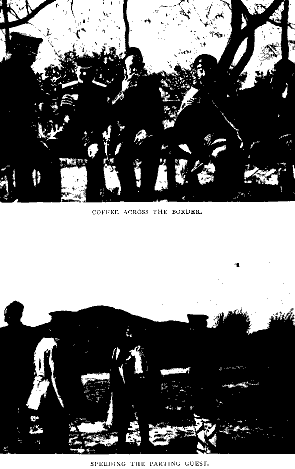
BUI.GAR BLOCKHOUSE.
MY FRIENDS.
The insurgent provinces
AT A BORDER BLOCKHOUSE

BUI.GAR BLOCKHOUSE.
MY FRIENDS.
"FAMILIARITY breeds contempt" is a well-proven saying amongst the sturdy Bulgarian frontier garrisons, both as applied to the Turks individually and to danger collectively.
During the long morning's ride we have passed many a detachment of Bulgar infantry holding small villages along the high road to pretty little Koestendil, drilling diligently and standing stiffly at the attention as our little cavalcade trotted past. Beyond the block-houses on the summit of the furthermost ridge, gleaming white from a sombre background of green foliage, are many thousands of Turkish troops, almost without discipline, ill clad, and extremely discontented from weeks of most unsatisfactory guerilla warfare. Here is danger, real and lively, very different from the reassuring atmosphere of Sofia and Constantinople, where diplomatists exchange notes and visits, and the destinies of little nations are decided in far-away cities, to international satisfaction.
"Over there," remarks the smart young adjutant of dragoons, pointing with his riding-whip to a small village clustering upon a far-away hillside, "a battalion of Turks raided a week or two ago. Unluckily, we had but a handful of men to oppose them, and reinforcements arrived only to pick up the nine men left behind."
171
![]()
"Our squadron came up an hour too late. It was a long march," adds his youthful comrade apologetically. "Still, we have hopes of future raids, when we shall be nearer."
We glance admiringly at our guard of honour, two as smart and well set-up young cavalry subalterns as could be seen in any crack cavalry regiment in more Western lands. They speak many languages, and their talk is good to hear after the inanities of barbarous and illiterate Turkish officers. It was last night we had met them, borne suddenly into their midst by a bluff colonel, our rescuer from the hands of the picket, who had stringent orders to arrest any strangers out after dark without permits, and who were carrying us off to the guard-room.
Evenings with Bulgarian officers are trying even to the strongest constitution, but how merry! Then it was that we expressed our desire to ride to the frontier, and lo! two officers, an orderly and a troop horse, awaited us this morning. We climb the last ridge slowly, for it is steep, towards the two block-houses, scarcely a hundred yards apart, upon its summit. Bulgar sentries, in long great-coats and flat caps, march smartly to and fro with fixed bayonets, watchful, keen, alert. A few yards away loll the Turks, in hated fez and ragged uniform. There are 200 of them behind the Turkish block-house, outnumbering the Bulgars by six to one. "Rather heavy odds," we remark; but the bearded lieutenant and commandant of this lonely station only smiles. "We are not afraid," he says, and conducts us into his quarters, whilst soldiers swiftly discover tablecloths, glass, and other accessories for the much-needed meal. A ride of twenty miles across the high-lying downs creates healthy
172
![]()
![]()
appetites, and as we feast the lieutenant discourses on the monotony of his post.
"It is not as if my neighbours were cultivated men," he says, nodding towards the Turks. "We have not a single topic of conversation. Later we will take our coffee with them, and you shall judge for yourselves."
The time passes quickly and pleasantly. We are shown captured bombs, heavy cylinders used for blowing up buildings, and the dreaded hand grenade, whose short fuse is calmly ignited by a burning cigarette and hurled amongst the attacking Turks. A man must indeed have nerves of iron to do this deed. Picture a devoted handful of men surrounded by an overwhelming force of infuriated Turks slowly but surely drawing ever nearer. Now they are a hundred yards away, fifty yards - luckily they shoot abominably - but it is too far to "put the weight" with effect. They must wait, though here and there a bullet aimed at random thins out the little band. A rush - Now. See! one coolly lights the fuse, and quickly hurls it at the foe. He must make no mistake, his aim must be correct and his arm strong. A slip at the moment of throwing means his and his comrades' lives instead of the Turks', for the fuse is very short. But he has thrown well; the Turks see it coming, and halt in blind fear. A deafening crash, screams and yells of anguish, and the Turks break and run, shot down by the triumphant insurgents. Down into the valleys they fly, to the nearest village, where their officers, anxious to save to themselves a semblance of authority, order its massacre and pillage. And next day we read of the extermination of another band.
"Those are the heights of Sultan-tepi," remarks the lieutenant, as we smoke our cigarettes outside, gazing on
173
![]()
the glorious expanse of rolling hills, and he tells us of a fight which he and many other officers witnessed through glasses ten days ago, when 111 insurgents were surrounded by 4,000 Turks, and fought for three days. On the third night the gallant little band, bombarded two long days in the forest by artillery, fought their way out at night with bombs, recrossing the frontier without the loss of a man.
"And what do the Turks say?" we ask.
"Oh, they admit 250 killed and wounded, but declare they wiped out the band."
And we all laugh, for we saw and spoke with the band in Sofia but a day or two ago, when brought down under a considerate and friendly escort of Bulgarian gendarmes.
A few minutes later and we are once more in Turkish territory. Under the shade of a small oak sits and squats a quaint assembly, sipping black coffee and blowing clouds of fragrant smoke. Side by side alternately sit Bulgarian cavalryman, in neat, picturesque uniform, and Turkish officer, ragged, unkempt, and sloven. The Turkish captain is an aged man, who admits sixty-one years of life, beside him the Bulgarian lieutenant, strong, tanned by sun and wind, and less than half his age. Next to him is the first lieutenant, a toothless old reprobate of forty-nine, who bares his gums in a hideous grin as he talks obscenely of the joys of the harem.
" 'Tis all he can talk about," says the Bulgar lieutenant in an apologetic voice, "and the others cannot talk at all."
Still, it is a strange sight, and recalls the story told us once in Adrianople, when a young and foolish Turkish subaltern described the abject fear of the Bulgarian frontier guards, who trembled when he spoke to them.
It is worth recording, and we put our camera to rights.
174
![]()

COFFEE ACROSS THE BORDER.
SPEEDING THE PARTING GUEST.
![]()
"Stop," says the Turkish lieutenant excitedly; "what wilt thou do? Not photograph us, for I am not in my best uniform?"
"Assuredly not," we respond mendaciously, as the camera clicks, and we fold it up once more, to the Turk's gracious thanks. The Bulgars, however, wink approvingly.
But time is flying, and when the Turkish lieutenant has concluded a childish rhyme in Greek, setting forth the charms of Western women, we depart. He accompanies us to the Bulgarian side, chuckling inanely because he and his company care not if they are unpaid.
"Our captain is a rich man. He has saved much money during his long life. If the Government does not pay us ultimately, we still have the old man to rob."
And he rambles foolishly on till the Bulgar catches a small pig and fondles it casually under the Turk's nose. With a gesture of disgust he relieves us of his presence.
As we ride down the ridge, the lieutenant winks comically, and, turning in his saddle, he laughs aloud.
"Now you see why we are not afraid," he says, "in spite of 'the heavy odds.' "
"We understand," is our response, in a tone of conviction.
[Previous] [Next]
[Back to Index]